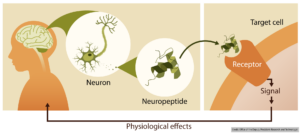
Drugs that treat conditions like depression and anxiety often come with varying side effects, as they regulate various functions within the human body at the same time. What if these drugs could activate only the functions that target the specific conditions that they are designed to treat?
A team of researchers has found a potential way to treat these conditions with fewer side effects. Led by Professor Gavin Dawe, Head of the Department of Pharmacology at the Yong Loo Lin School of Medicine, National University of Singapore (NUS Medicine), the team conducted modifications of relaxin-3—a neuropeptide, or molecule, found mainly in the human brain and nervous system—which regulates a wide range of physiological functions, including stress responses, appetite, mood and pain perception. When relaxin-3 is released in the brain, it binds to a target receptor RXFP3—to trigger a variety of signalling responses among the cells, which affect the body’s physiological processes.
For more details: https://medicine.nus.edu.sg/wp-content/uploads/2024/02/2024-02-19-Press-Release-Modifying-Relaxin-3-can-potentially-reduce-side-effects_final.pdf
Image credit: Office of the Deputy President (Research and Technology)
